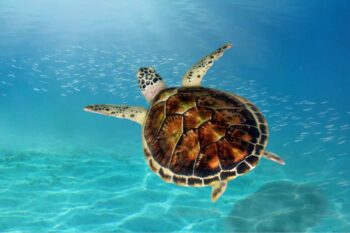
If you are quiet or see yourself as an introvert, I have your spirit animal ready. Sea turtles and their world may resonate with you.
The first contact turtles have with each other is at birth. The hatchlings leave their sand nest, instinctively looking for the sea. Once the find that ocean edge, they separate and do not socialize again with other turtles until mating. They lead a content and solitary life, coming back to shore when it is time to mate.
Sea turtles do not need have a BFF, a family, or a social connection. They live alone, handling what comes their way on their own. They are a gentle species. Sharing habitat with a diverse range of species, they are without aggression or the need to dominate another species or take over a specific territory.
Male sea turtles are not pack leaders. There is no pecking order in turtle life. They have no need to prove their worth to any turtle or other ocean creature. They do not “pick” a mate or fight over a female turtle. It is the female turtle who chooses whether she wants to mate with a certain turtle or not.
As most of us know, most of these turtles could use a little help.
Six of the seven sea turtle species are threatened with extinction due to impacts made by humans. Five of seven sea turtle species live in North Carolina waters and include the loggerhead, the green, hawksbill, Kemp’s ridley and leatherback.
It is estimated that only one out of 1,000 turtle hatchlings will survive to be an adult. A female can lay thousands of eggs over her lifetime, so at least a few of them survive to maintain the species. During nesting season, females of most species of sea turtles will nest about every 2 weeks over several months and lay multiple nests before leaving the nesting area and returning to their foraging grounds. She will return to the general area where she hatched decades earlier to create more nests of sea turtles. Over her lifetime, a female will produce thousands of eggs and hatchlings. But natural predators including birds, crabs, fish, and mammals like racoons can destroy many young and small turtles, so every survivor is precious.
And there is pollution and marine debris. Turtles can ingest fishing line, balloons, plastic bags, floating tar or oil and many other things they mistake for food. An increasing threat to the sea turtle is microplastics, making your turtles who live and feed near the surface of the ocean especially vulnerable. The small moments of not disposing of trash properly while you are enjoying the beach or a day out on a boat can create a huge impact on marine life.
The top five threats to sea turtles are:
Fisheries Bycatch: Considered the greatest threat to sea turtle populations worldwide, scientists estimate that millions of sea turtles have been accidentally captured by fisheries since 1990.
Pollution: Plastic pollution, oil spills, and chemical runoff all impact sea turtles. A recent study found plastic in the stomachs of more than one-third of leatherback turtles found dead since 1968.
Coastal Development: Development of coastal areas where sea turtles breed and nest can impact sea turtles in many ways, including disorientation from light pollution, boat collisions, and nest disturbance.
Direct Take: Sea turtles and their eggs are taken by people (both legally and illegally) in many parts of the world for consumption and use of shell material for handicrafts and jewelry.
Climate Change: Rising sea level, hotter temperatures, and increased storm frequency caused by climate change may be leading to the loss of suitable nesting habitats and affecting natural sex ratios, which are determined by nest incubation temperature.
So, what can a quiet, introvert do to protect and honor your spirit animal? Wear your turtle badge proudly, donate to your favorite turtle conservancy, volunteer for a beach cleanup if you feel socially brave. Small things add up to a beautiful turtle world.
Donate – Network for Endangered Sea Turtles – Outer Banks, NC (nestonline.org)
MAKE A DONATION | North Carolina Aquarium Society (ncaquariumsociety.com)
Make a Contribution to Support Ocean Conservation (seaturtles.org)

